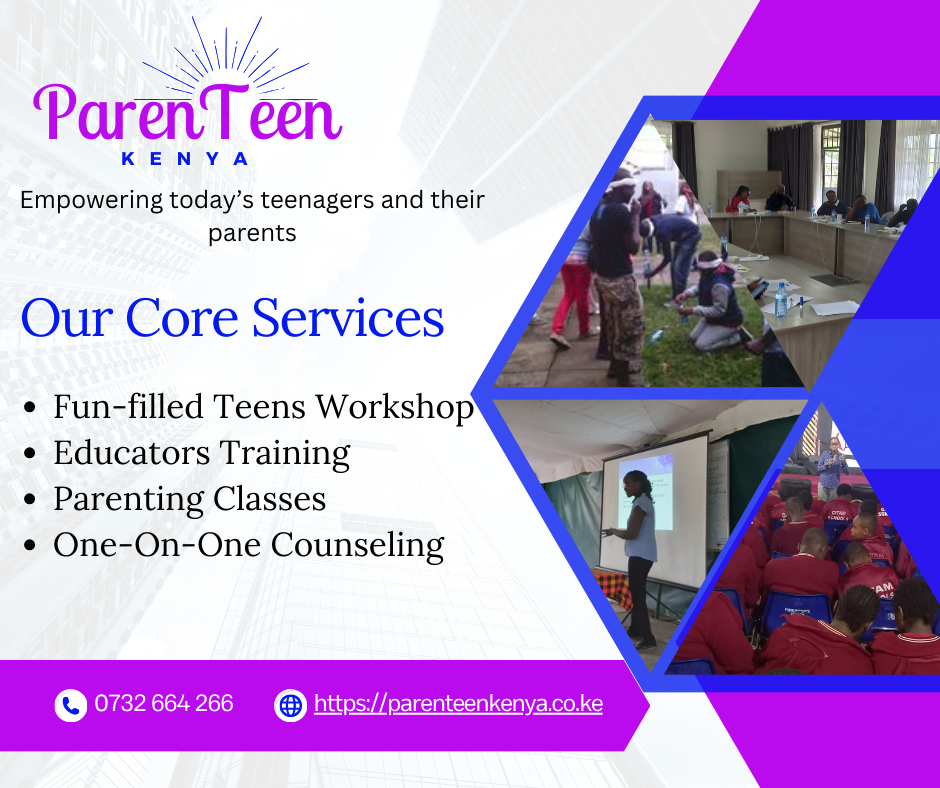Did you know that people between 18–29 years are now referred to as Emerging Adults?
It is the most recent developmental stage added to accommodate people between adolescence and adulthood.
Traditionally, the markers of becoming an adult were leaving home, finding employment, getting married, and having children. In contrast, the current criteria to qualify as an adult are:
- Making independent decisions
- Becoming financially independent
- Accepting responsibility for yourself
This developmental stage was coined by Psychologist Jeffrey Arnett in his book Emerging Adulthood. He notes that various factors have contributed to the changes that led society to rethink how they handle the twenty-somethings.
Today, ParenTeen Kenya will discuss the main influences causing older teens and young adults to take longer to mature.
Increased Parental Involvement

Wambui, 53, always called and texted her 19 and 24-year-old children, giving them unsolicited advice. She felt she needed to do it because her parents rarely supported her when she went to college.
After some time, Wambui’s children respectfully told her to back off and let them make their own decisions. They felt she did not believe they could handle challenges or act responsibly. She needed to believe that she had taught them well and were capable of making the right decisions.
Like Wambui, many parents want to be involved in every aspect of their young adult’s life. They feel like they need to micromanage everything about:
- Where they go
- Who they befriend
- The job application they send
- Their diet
- What they buy
Studies have found a correlation between slower development in adolescents and young adults with smaller family size, higher income, and higher parental age. Parents having fewer children means they have more resources and time to give their children (or child).
Modern parents supervise their young adults more closely. They organize their activities such that they have little time to be creative. They also have nannies at home to do the house chores. Hence, they don’t have to be responsible for their own space or well-being.
Another change that has contributed to increased parental involvement is the shift in the economy. More people can now go to college after high school, unlike the previous generation, where you had no alternative but to look for a job—-which was readily available.
The extended learning opportunities have caused older teens and young adults to become financially dependent on their parents for longer.
After college, parents continue to give financial support as the young adult moves back home. Some delay looking for employment because the financial support continues, and the parent doesn’t mind giving it. This scenario leads to more young adults delaying independence.
For your well-being: 4 Stress Management Techniques for Parents in the Workplace
Prolonged Education Life

Compared to decades ago, the educational journey is taking longer to end. In the 50s and 60s, a high school certificate could get you a reasonable job. Those who went to college were considered privileged, and they were few.
From the 70s to 2000, having a technical skill, diploma, or degree could get you a well-paying job. In fact, a high school certificate was not enough for most job opportunities.
Besides, the education system has expanded tremendously to allow more people to study to a degree level. For example, in Kenya, more young people than ever are admitted to the university.
The following graph gives data for university admission in Kenya from 2017 to 2022. In the 1990s, admission was about 50,000 students per year.

Image Source: Statista
These numbers mean that older teens and young adults in less privileged and rural areas can now access a college education. In the process, they delay looking for a job, starting a family, and settling down to a career.
Another twist that has emerged is that you need to have a master’s degree to get a well-paying job. In fact, a job opportunity for a degree holder can have many masters graduates applying. This forces young people to continue to masters to measure up to the current market.
As a result, young adults finish postgraduate studies in their late twenties. Before they adopt adult responsibilities like settling into a job or starting a family, they’re already in their mid-30s.
Related: 3 Top Things to Teach Your Teen on The Value of Money
Landmark Societal Changes
According to Arnett, four significant societal changes occurred in the 60s and 70s that contributed to the emergence of this developmental stage. Let’s look at each.
Technology revolution
Undoubtedly, the internet, mobile phone, and social media have changed how people relate to and view the world. For example, with the phone and internet, parents can continue to micromanage their young adult’s life from miles away.
Further, social media has caused older teens to interact with people from other continents and copy their cultures. For instance, Kenyan older teens and young adults are being influenced online to choose singlehood (by rejecting traditional practices like marriage), welcome abortion, and adopt the LGBTQ lifestyle.
Sexual Revolution

The sexual revolution started as a social movement that challenged the traditional way of viewing sexuality and interpersonal relationships. It began in the western world but has spread to Africa, including Kenya. Sexual revolution intended to promote:
- The normalcy of sex outside the traditional heterogeneous relationship
- Rejection of monogamous relationship (marriage)
- Normalization of contraception for teens and young adults
- Introduction and acceptance of alternative forms of sexuality (LGBTQ)
- Acceptance and fight to legalize abortion
The rejected traditional practices were used as marks of getting into adulthood. Hence, the current generation has blurry pointers in determining when they attain maturity.
The Women’s Movement
The Women’s liberation movement emerged in the western world and spread worldwide. It started as a political group that fought for the economic, psychological, and social freedom of women regarded as second-class citizens.
Undoubtedly, the movement helped women to gain a prominent place in society. However, it also caused women to shun their traditional roles of being homemakers.
Since more women do not want the responsibility of being a wife and mother, young ladies are advised to delay marriage and avoid having children. In its place, they are to pursue higher education and look for prestigious positions.
The Youth Movement
Youth movements emerged when teenagers and young adults were placed in groups for political, recreational, or educational purposes. These groups started to create agendas that attempted to resist or change societal norms.
Youth movements often focus on intergenerational conflicts where young people are dissatisfied with the status quo and want change in the social or political arena. Other youth movements focus on fighting each other depending on their agendas.
Involvement with youth movements has contributed to the delay in adulthood. These youths resist taking on adult roles for the sake of the group’s agenda.
Is There Anything You Can Do?

Transitioning from adolescence to adulthood is not as straightforward as it used to be. You need to understand that your older teenager or young adult faces different challenges than you did.
Understanding what contributes most to your young adults’ delay in taking responsibility is the first step in addressing the situation.
Next, work on the things you can control, such as trying to run their lives and resisting the urge to monitor their every move.
After reading this article, you can also inform them how society has changed. In addition, mention the pros and cons of delaying these milestones. Afterward, let them decide which direction they want to take.
Contact ParenTeen Kenya for more guidance on how to have this discussion. We also offer one-on-one counseling for young people struggling to find their path.
Image Source: Unsplash and Pexel
Jane Kariuki is a devout Christian, Clinician, Psychologist, and founder of ParenTeen Kenya. She authored an exceptional training manual used in her teens’ workshop and an instructional guidebook for her parenting classes. If she is not training, blogging, or counseling, Jane loves to spend time with her sweet husband and three children.







